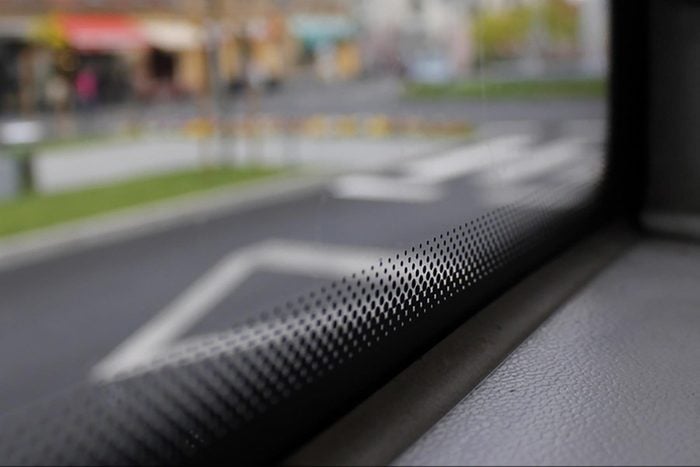Here’s Why Car Windows Have Those Little Black Dots
Updated: Feb. 10, 2021

No, they're not just for decoration.
You probably haven’t given much thought to the pattern of little black dots on the edges of car and bus windows. Sure, they look cool, but do they do anything?
Those black dots on windshields and windows and the black rims that surround them do have a reason for being there (other than decoration). It has to do with how car windows are made—from the 1950s and ’60s onward, car manufacturers started to use an adhesive to hold car windows in place, rather than metal trim. Want to feel nostalgic? Check out these photos of cars that were all the rage at that time.
This adhesive got the job done, but it wasn’t very aesthetically pleasing. Enter the black rims that you see around car windows, called “frits.” The frits (and the dots that border them) are made from ceramic paint. The frits are there to hide the rather icky-looking, but very important, adhesive from view. Also, since these painted rims are baked—yes, baked—into the window, they are all but indestructible. They hold the glue in place, which in turn holds the windows in place. Here are some more little car features you never knew existed.
As for the dots, they are there to make an aesthetically pleasing transition from the thick black lines to the transparency of the window. The dots aren’t randomly placed; they are positioned in what’s known as a “halftone pattern,” getting smaller and farther apart as the black recedes. This pattern is less jarring to the eye than opaque black paint juxtaposed with transparent glass. However, even the dots aren’t just there for decoration. Their other purpose, besides the visual effect, is to provide temperature control. To get the glass of windows and windshields to be bent the way it is, the glass is heated up. The black-painted glass heats up faster than the rest of the window. The dots are there to distribute the heat a little more evenly, which prevents the windshield from warping in the heat.
So, now you know! Read on to find the explanations behind 30 more little things you’ve always wondered about.



